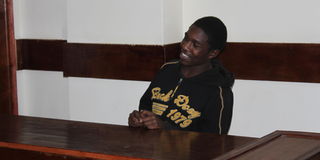Shocking details revealed in court linking Ezekiel Mwangi to the murder of four women in Nakuru

Ezekiel Mwangi accused of killing four women is presented in a Nakuru court on September 19, 2024.
As Ezekiel Mwangi approached the courtroom, he stood out because of his small stature and slow walk, accompanied by three police officers.
As he sat on one of the benches waiting for the judge to enter the courtroom, he could be seen talking to the police officers he had come with.
The moment of truth arrived and the judge entered. Ezekiel was in the dock ready to plead for the alleged murder of four women in Rongai and Nakuru Town West between July 13, 2024 and August 7, 2024.
Sitting in the front row was Joash Onchoke, uncle of the late Vera Mugambi, the last victim of the alleged serial killer, who watched the proceedings intently to know the suspect's fate.
At the reading of each count, Ezekiel responded "Si kweli" and when addressing the judge, "yes judge" was his answer. A smile occasionally escaped his lips.
A psychological report conducted at the Nakuru County Referral and Teaching Hospital (NCRTH) on September 18 and seen by Mtaa Wangu indicates that Ezekiel exhibited symptoms of antisocial personality disorder.
The report concluded that the 20-year-old was "aware of the charges he is facing and capable of following court proceedings".
In shocking detail, the report also outlines the suspect's confession and paints a picture of what drove him to carry out the heinous murders.
"Ezekiel Mwangi was arrested as a suspect in the murder of four women. He says he murdered some of them because he was angry at the chief for chasing him away and others because he was hungry. After killing them, he took off their clothes and raped them,' reads part of the report.
"After killing the fourth person, he went back and cut off his ears and right thumb because he had nightmares about the murders. He did this to stop the ghosts of the victims haunting him. He felt no remorse after the murders".
In an affidavit, the investigating officer, Vincent Lang'at, objected to the accused being granted bail and instead he be remanded and put in custody pending the outcome of the case.
Police have since gathered evidence linking the accused to the victims whose bodies were found in maize plantations in Rongai sub-county.
Mr Lang'at told the court that the accused was found with a mobile phone belonging to Vera Mugambi, one of the victims found dead on August 8.
Furthermore, DNA samples taken from the accused matched those taken from the vaginal swab of Alice Ayuma, the five-year-old whose body was found on July 14.
"There was a match in the samples of the vaginal swab taken from Alice to the DNA profile of the defendant. There were also blood stains on the trousers, shoes and shirt, which produced DNA that matched that of Alice Ayuma," Mr Lang'at says.
It is the similarity in the way the murders were carried out that has convinced investigators that the murders were committed by the same killer.

